- Home
- Sam Gayton
The Adventures of Lettie Peppercorn Page 13
The Adventures of Lettie Peppercorn Read online
Page 13
The Thief, the Liar, the Cheat, and the Clam
Now Ma had finished her story. The laboratory was still, and the fire dwindled.
Lettie sat and took small, uncertain sips of her tea. It had gone cold, but she barely noticed. She was thinking.
“Are you all right?” Ma said softly.
Lettie wasn’t sure yet. She needed to think some more.
“Listening to a long story is like eating too much food,” said Ma. “Sometimes you need a bit of time afterward, to sit and digest.”
Lettie nodded: she felt full, almost to bursting. She had to get some of her thoughts out before she went bang.
“You’re made from air,” said Lettie.
“Air, æther, and a little glue. Thank goodness you’re still only twelve . . . If you were any older you might not have been able to believe it all.”
“And I’m . . . I’m made of stone.”
“Not just stone,” said Ma. “A thousand things besides . . . Alchemy is change, Lettie. And change can’t stop. After you were born, we kept adding things into the mix.”
“Like what?”
“I don’t have the words, Lettie, so I shall have to borrow them from someone else: ‘Little, nameless, unremembered acts of kindness and of love,’ ” she quoted. “That’s what we poured into you, after you were born: our love and time and hope. But then I left, and we stopped doing that.”
“That’s not true, Ma,” said Lettie. “When you first came up, you took your hands from me and dropped them into your oven gloves. They’ve been holding on to me for years, haven’t they?”
“That’s right,” said Ma. “Giving you little tugs in the right direction. They guided you here.”
Lettie shook her head in wonder. “I knew there was something in the wind guiding me, pulling me this way and that. I just never knew that something was you.”
“It was all the mothering I could do, Lettie, and it wasn’t enough, I know. I’m sorry. It took me a long time to put myself back together. But I’m here now, and we can be a family again.”
“The strangest family in the whole world,” said Lettie. “A stone, a breeze, and a beer bottle.”
Ma laughed. “Yes! Though you don’t have to worry about being a stone, Lettie. Not now that my old master has come to return what he stole ten years ago.”
She looked up to where Blüstav floated, making little whimpering sounds.
“Let it go,” Ma said firmly. “It’s a cloud, and it belongs in the sky.”
“But it’s mine,” said Blüstav, his voice a squeak. He swam frantically through the air toward the window.
“For ten years, you’ve put my daughter’s life in danger. Now the chase is over. Let it go.”
“If you don’t, I’ll die,” said Lettie. “One day, I’ll turn to stone. Do you want that to happen?”
He shook his head violently, then yelped as the snow cloud in his coat gave him another shock.
“Where are you going to escape to this time, Blüstav?” Ma asked sternly. “Can you outrun the Wind?”
He reached the window, fumbling at the latch. Watching sadly, Ma stepped on the vines still wrapped around his arms and legs.
“Let me go!” begged Blüstav, throwing open the window.
“You’ve been freezing cold for ten whole years because of that cloud,” said Lettie. “Why don’t you just let it go? Please, Blüstav. Please.”
There was a tense silence as Blüstav’s hand twitched at his collar. He undid a button, slowly, as if it was causing him great agony. A whole minute passed. Another button came loose. A white wisp of cloud slithered out from his neck. He began to sink to the floor.
Lettie was amazed. Finally Blüstav had overcome his greed. He had really changed; he’d undergone alchemy.
“Thank you,” said Ma, holding out her hand for him to shake. “Thank you, Blüstav.”
He took her gloved hand, and then Lettie saw that gleam in his eye; that sharpness.
“Don’t!” she shouted, too late.
Blüstav didn’t shake Ma’s hand, he pulled. He snatched off her glove and threw it out the window.
“Ma!” Lettie cried.
Ma snatched her sleeve, trying to close the hole, but already a gust had whipped her from her coat and thrown her around the room. The chandelier rocked, the windows swung, and some old books fell from the shelves. Lettie whirled about, searching for Ma, seeing nothing. Her clothes lay in a heap where she had been. Lifeless things. The oven gloves, the goggles, the blue coat. All tied together with brown string; all empty of Ma.
Where was she? Out the window, above the iceberg, or were parts of her still inside? Lettie’s eyes were useless, so she screwed them shut. She felt for Ma instead; trying to feel the pull of a hand, but there was no direction to the wind. It pulled and pushed, it nudged left and right, it spun her around. There was no direction. There was no purpose. There was no Ma.
She was gone.
Lettie looked up at Blüstav and shouted, “Why?”
She saw the answer in his eyes, shining like coins. He might have defrosted, but he hadn’t changed really. He kicked with his hands and propelled himself outside. Noah leaped for the vines, but they whipped away too fast for his hands, and Blüstav was free.
“That was my ma,” Lettie called after him, her voice breaking up into sobs. “That was my ma!”
With Noah she ran to the window as Blüstav floated away. Lettie felt like he had hooks in her heart, because watching him she felt a wrenching, tearing, rending inside, worse than anything she had ever felt before. He was pulling out her hope, Lettie realized; the hope she had always carried, its roots went so deep. But now Ma and the snow cloud were lost, and Lettie was marooned on the top of an iceberg.
“What’s left?” she said to Noah through her tears. “What’s left to hope for now?”
Noah couldn’t answer.
Ma couldn’t guide her.
With no one else to turn to, Lettie looked at the horizon for someone to come.
Please, God, she prayed. Send someone. Anyone.
Then she spotted them.
“Anyone but them!” she cried out. “Anyone but them!”
She grabbed her telescope, pulled it open, and watched the Bloodbucket as it hurtled toward the iceberg, spitting fire and smoke.
How had the crones tracked them through the clouds, all the way to the iceberg? It was the Goggler’s scopical glasses. It had to be. Lettie watched her from the deck. Her hair was soggy (from where the Walrus had dunked her), and the whalers had fixed her glasses together with string and spit. She was standing well away from the Walrus, whose piggy eyes glared.
Then the Goggler began to jump and point straight at Blüstav. And Blubber Johnson cranked the harpoon gun up toward the alchemist.
“Oh, no!” said Lettie.
“If that harpoon hits Blüstav, he’ll be skewered,” said Noah, and Lettie winced. No matter what Blüstav had just done, she couldn’t wish something that gruesome on anybody.
“I can’t watch!” she said, shutting her eyes as Blubber Johnson fired.
“Missed!” cried Noah instantly, and Lettie looked up to see the harpoon already far past Blüstav and arcing back down into the sea. The alchemist swam through the air as fast as he could, rising up and up, toward the safety of a cloud. He kicked his legs and flailed his arms, but his limbs were still strung with Noah’s vines, so his strokes were rather feeble.
“He’ll escape,” said Lettie, looking back to the Bloodbucket. “They’re used to fishing things from the sea, not the sky.”
As Blubber Johnson loaded another harpoon the Goggler elbowed him away, taking the gun and aiming it herself.
“She won’t miss,” said Noah. “Not with those scopical glasses.”
Steam spurted from the gun, and the harpoon shot into the air. It flew up, a gigantic arrow of iron, coursed to pluck Blüstav from the sky. The higher it got, the slower it went as gravity pulled it back down. It stopped, barely five f
eet below the alchemist’s wriggling feet, before it began to fall.
“She missed!” said Noah, utterly mystified. “I don’t believe it!”
But, Lettie realized a moment later, the Goggler had not been aiming for Blüstav at all. She had aimed for a far larger target: the canopy of vines below him.
The harpoon dropped into the very same tangle of vines that the suitcase had hung in an hour beforehand. It stretched them taut as harp strings, but not one of them snapped. Noah had grown them far too strong.
“Very clever,” said Noah, a touch of admiration in his voice. “If she had aimed for Blüstav, the harpoon would have pierced his coat and the cloud would have escaped.”
“Yes,” said Lettie bitterly. “This way, the crones get snow and their revenge.”
The harpoon lay in the canopy. Blüstav still swam and kicked and flailed, until the veins on his neck stood out like cords. But he could do nothing to stop himself from sinking slowly down to the Bloodbucket, where two old ladies prowled upon the deck like wild animals. Restless. Hungry.
Keeping her telescope on Blüstav, Lettie couldn’t help feeling that he would devise some new, miraculous means of escape. Sure enough, she watched him edge his fingers round the curve of his coat toward a pocket. He stretched and strained, all the while sinking closer to the deck of the Bloodbucket, where Grot-Nose Charlie waited with a net and Captain McNulty popped the lid off an empty barrel.
“That must be what they’re planning to put the snow cloud in,” said Noah. “After they pry it out of Blüstav.”
Lettie grimaced. She closed her eyes and tried to feel Ma. Nothing. There was nothing she could do but stand at the window and watch. It made her think back to her old life, at the White Horse Inn. How horrible and frustrating it was!
She willed Blüstav’s fingers into that pocket. The alchemist was barely ten feet from the deck.
“Come on . . . Almost there . . .”
Suddenly his fingers were in, and closing around something: a bottle! He had one alchemical left, but what was it? Lettie thought she had used them all aboard Leutha’s Wood. But, no . . . She recognized this one: Blüstav had used it before, on the Walrus and on Da. It was gastromajus, the alchemical that turned a person into their last meal.
At once the crones leaped back, terrified. The Walrus covered her head and the Goggler dived under Captain McNulty’s legs. But Blüstav unscrewed the bottle and held it to his own mouth.
“He’s using it on himself!” Noah cried.
And ten feet above the deck, Blüstav let three pink drops fall upon his tongue and tipped the rest over his head. It poured down his coat, soaking him from head to foot.
Black smoke billowed. Green sparks flew. His head shrank and his body grew. His coat turned gray and began to blister.
“What is he becoming?” Lettie wondered aloud.
Noah frowned. “He didn’t have any tea just now.”
“I don’t think I’ve ever seen him eat anything,” said Lettie.
“I’m sure I have. But what was it?”
And Noah and Lettie cast back into their minds to catch the memory, like a pair of fishermen throwing their lines downstream, until at once they both shouted aloud:
“Clams on Leutha’s Wood !”
Looking back, Lettie saw the smoke clear. Blüstav had vanished, and in his place was a speckled black oval, three feet wide. Through the eye of the telescope, the clam looked like the egg of some colossal chicken. Blüstav tumbled down onto the deck, landing with a crunch on the wooden planks.
Blüstav the liar, thought Lettie. Blüstav the thief, Blüstav the cheat . . . and now, Blüstav the clam.
“He’s trapped the snow cloud inside his shell,” said Noah. “He’s swallowed it.”
On the deck of the Bloodbucket, the Goggler peered out from beneath Captain McNulty. The Walrus crept as close as she could to the clam. Grot-Nose Charlie sharpened his dagger on his boot and grinned.
“They’re going to pry it out of him, though,” said Lettie, shaking her head. “I can’t stand this watching, Noah! We have to do something!”
“Do what, Lettie?” The leaves on his shoulder were curling with frustration. She could see his green eyes searching her for something: a plan, an idea, anything.
“I don’t know, Noah!” She almost howled it. “Blüstav is there, and we’re here, and Ma has vanished, and we can’t change a thing.”
“We must be able to,” said Noah. “It’s the first rule of alchemy: things change.”
And then she saw it: a spark of something in his eyes.
And then she felt the spark too, in her heart. A flicker of something . . . an ember of hope.
“I think . . . ” she bit her lip, “ . . . I think I have an idea. It might be impossible—”
Noah laughed. “Lettie, I don’t believe in ‘impossible,’ and neither do you!” He gripped her arm. “Tell me how we get the snow back.”
“It’s simple really,” Lettie found herself saying. “We’re going to go over to the Bloodbucket, and fight for it!”
“It’s an awfully long way to swim,” said Noah.
“Then we’re going to need awfully big flippers,” said Lettie as she took his hand. “Come on!”
Lettie Peppercorn Stitches the Waves
Lettie pulled Noah over to the cauldron, and together they emptied out the dregs of tea.
“We’re going to do some alchemy,” she told him. “Something that will make us strong enough to swim over there and fight!”
“Yes!” he cried. His eyes flickered across the floor at all of the strewn-about papers. “Where’s the recipe we’re using?”
“No time for recipes, Noah. We’ll just do what feels right.”
“But we need books for alchemy,” insisted Noah. “And alchemicals, and your ma to help us, and—”
“All we need is imagination,” insisted Lettie. “How hard can it be? First, choose the ingredients. Second, mix them together. Finally, decide how much to drink.”
Noah laughed. “When you put it like that, it sounds easy!”
Lettie laughed too and a jitter of adrenaline ran through her. This might work! “Get the fire roaring, and I’ll find us some things to mix.”
“Wait a minute, Lettie. What are we turning ourselves into?”
Lettie shrugged. “Something strong enough to swim through that freezing sea; something big enough to take on the Bloodbucket. But I can’t tell you exactly what it will be yet . . . wait and see. Do you trust me?”
“Of course I do!” said Noah. “I saw you on Leutha’s Wood with all those alchemicals.”
Lettie felt herself turning red. “I was just following Ma.”
“You still managed something incredible,” said Noah. “You’ve got your ma’s talent. You’re made from alchemy yourself. You’ll do this. I know you will.”
Lettie felt a huge swell of pride. Noah trusted her, and that was enough. She turned away from him and began to scour the room for ingredients.
“Choose anything,” she breathed to herself. “As long as it feels right.”
She started with water: scraping flakes of ice from the window and leaving them to melt in the cauldron. After that she flicked through some books lying scattered on the floor, but they were all useless and very boring. She stripped the leather covers from twenty of them—she liked how tough they were—and left them all in a pile. Sifting around in one of the other rooms, she found a tiny glass bell unbroken. It looked so lonely there among its shattered friends that she couldn’t resist picking it up.
Back in the laboratory, she found a whole trove of lost things: a green marble and some rubber bands down one of the armchairs, and a silk paintbrush, a silver shilling, and a compass. She took the needle from the compass and the silk threads from the paintbrush, but she left everything else because it was junk. If she added too many useless things, the alchemy wouldn’t work.
That was everything from the floor. She turned her attention to the ceiling.
Something caught her eye at once. She found an old stepladder, climbed it, and took a glittering shard from the icicle chandelier above. It was beautiful, and hard as a diamond. She slipped it in her pocket and jumped to the floor.
There was something else: a missing ingredient. She wondered what it was. It had something to do with the glass bell.
“Music!” she cried suddenly. “I’ll get that in a moment.”
Lettie knew somehow that all the ingredients had been gathered, and it was time now to mix them. She went back to the cauldron, where the water simmered and Noah made the bellows wheeze.
“I’ve done the choosing,” Lettie told him. “Now for the mixing.”
With her compass needle, Lettie began to weave through the water from North to East to South to West. She wanted to stitch the ripples together into spirals. She sewed and sewed, until her fingers ached and she had to stop.
“The water’s stirring itself,” said Noah, full of awe. “How is it doing that?”
“I’ve stitched it into spirals, see?” Lettie explained. “North to East to South to West.”
The cauldron now held a miniature whirlpool. It was time for Lettie’s next ingredient. She took the needle and pricked a tiny hole in the glass bell.
“Sing into this, Noah,” she said. “A song you know. A song that feels right.”
While he thought about what to sing, Lettie took the silk threads from her pocket and poked them inside the bell. They would soak up the song and keep it there, Lettie was sure of it.
“Are you ready?” she said to him, holding out the bell.
Shyly, Noah began to sing. It was the hundredth verse of a song that Lettie knew; she had heard it days before, standing outside the Clam Before the Storm:
“The albatross, her wings unfurled
Called to him, as off she flew:
‘The sea will wash away the world,
The world will rise again, anew.
But oh, to your own self be true!
To your own self be true!’ ”
Noah finished, his voice sweet and nervous, and then he covered the hole with his thumb.

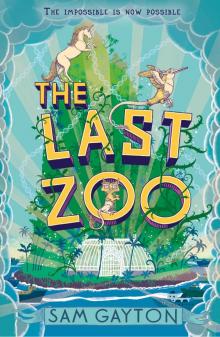 The Last Zoo
The Last Zoo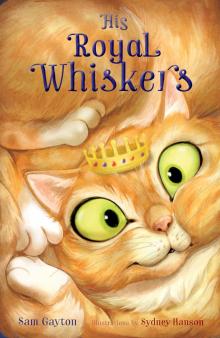 His Royal Whiskers
His Royal Whiskers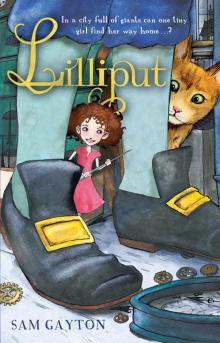 Lilliput
Lilliput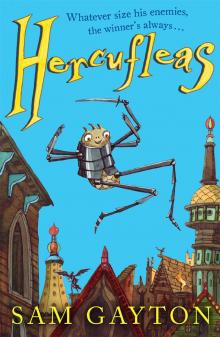 Hercufleas
Hercufleas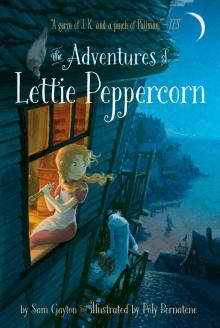 The Adventures of Lettie Peppercorn
The Adventures of Lettie Peppercorn